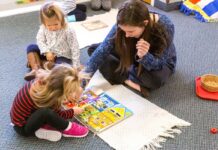
One of the most common and popular things that parents do for their children is to read nursery rhymes to them and teach them how to read them as well. Nursery rhymes aren’t just small cute little passages, as there are plenty of advantages towards reading these that can help with your child’s early literacy and having them read and write at a much higher level earlier than other children. Nothing special has to be done with how you read the nursery rhymes either, simply engaging your child with them is enough to get their brain rolling and developing. Here are some ways that nursery rhymes can help with your child’s early literacy.
They Are Short and Sweet

Nursery rhymes are fantastic for early literacy due to their length. Have you ever read a nursery rhyme that was longer than several minutes? The answer to that question is most likely no. As stated by the experts at LyricsReg.com, this is what makes nursery rhymes so great for a child’s early literacy skills. Because they are so short and down to the point, your child can give enough focus to it to understand what is going on and learn the words that are being used. Science has shown that an adult’s attention span is fairly short, now imagine the attention span of a young child whose brain is just developing. They will only be able to handle a short bit of information and knowledge, and for that reason, nursery rhymes work well for them. They will very easily be able to remember the intro, middle, and the end of the rhyme and connect the story. Because you no longer have to memorize and remember nursery rhymes with websites like this, it opens up plenty of options for what rhymes to read to your child next. Remember not to overwhelm them with too much and give their brain time to digest everything that has been read. Nursery rhymes are great for early literacy because they are short and sweet and allow your child to remain fully focused on them.
They Teach Early Sentence Structure

When teaching someone a new subject or topic, the last thing that you want to do is introduce them to the difficult concepts first. What people don’t understand is that we work as teachers for our children in regards to the English language. The best way to teach them how to form sentences is to do so in a very basic way. Nursery rhymes are great for this as sentences are very short and down to the point. Think of the nursery rhyme Jack and Jill for example. The first sentence is extremely simple and contains only what is necessary for a sentence. Jack and Jill went up the hill. The sentence is broken down into a subject (Jack and Jill), a verb (went), and an object (up the hill). The sentence does not contain any extra words and it allows the child to easily learn what it takes for a sentence to be made. If you look through any of the nursery rhymes, you will find that they all follow a similar style of writing, allowing you to read any of them to your children. Soon, you will find them forming rudimentary sentences using the knowledge they have gained from these nursery rhymes. Always remember that we learn to walk before we learn to run and the same should apply with how we teach English sentence structure. Nursery rhymes are great as they teach your child how to form sentences at an early age.
Rhymes Help with Pronunciation

Nursery rhymes contain a ton of rhymes that make the sentences flow right off of the tongue. As your child begins to hear these rhymes, they will start to associate them with the words and learn basic phonetic pronunciation. Once again think of the nursery rhyme Jack and Jill. The first two lines consist of the words, Jill and Hill. At first, your child will just hear these two words and be amused at how close they sound to each other. As they hear the rhyme more and more and see the words written down, they will notice the shapes of these words. They might not be old enough to understand letters and the alphabet, however, they will notice that both of these words look the same except for one letter. As they then start to learn the alphabet and the sounds that these words make, they will gain a head start on pronunciation as they can begin to apply the knowledge they used beforehand. These rhymes are patterns within the story itself and your child will recognize it and use it to learn other words. Nursery rhymes are great for early literacy due to the large number of rhymes that occur within them.
Nursery Rhymes Make Reading Fun

Finally, when teaching your child anything, the most important thing is that they are actively engaged and enjoying what they do. Nursery rhymes are great as they are specifically made for a child to enjoy. You will find your child wanting to read these rhymes by themselves and also asking you to read to them before bed as they will enjoy the sounds of the rhymes as well as the stories and the images that they create. This is what makes a nursery rhyme perfect. They teach your child without them knowing that they are learning something new. Nursery rhymes are great for early literacy as they make reading fun and enjoyable for them.
Nursery rhymes will always exist in our society as they have proven to be a great literacy tool for children looking to read and write. Their fun nature mixed with their short sentences and short overall length makes them a perfect tool to help develop their vocabulary. The other amazing thing is that there are hundreds, if not thousands of nursery rhymes available online that you can find and read to your child whenever they want to hear one. What is your child’s favorite rhyme?











